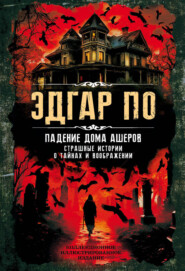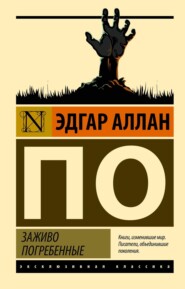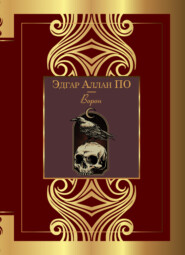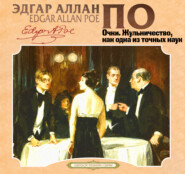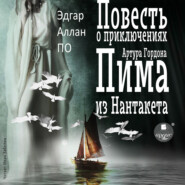По всем вопросам обращайтесь на: info@litportal.ru
(©) 2003-2024.
✖
The Works of Edgar Allan Poe – Volume 5
Настройки чтения
Размер шрифта
Высота строк
Поля
In beauty vie!
Beyond the line of blue —
The boundary of the star
Which turneth at the view
Of thy barrier and thy bar —
Of the barrier overgone
By the comets who were cast
From their pride, and from their throne
To be drudges till the last —
To be carriers of fire
(The red fire of their heart)
With speed that may not tire
And with pain that shall not part —
Who livest —that we know —
In Eternity – we feel —
But the shadow of whose brow
What spirit shall reveal?
Tho’ the beings whom thy Nesace,
Thy messenger hath known
Have dream’d for thy Infinity
[17 - The Humanitarians held that God was to be understood ashaving a really human form. —Vide Clarke’s Sermons, vol.1, page 26, fol. edit.The drift of Milton’s argument, leads him to employ languagewhich would appear, at first sight, to verge upon theirdoctrine; but it will be seen immediately, that he guardshimself against the charge of having adopted one of the mostignorant errors of the dark ages of the church. —Dr. Sumner’s Notes on Milton’s Christian Doctrine.This opinion, in spite of many testimonies to the contrary,could never have been very general. Andeus, a Syrian ofMesopotamia, was condemned for the opinion, as heretical. Helived in the beginning of the fourth century. His discipleswere called Anthropmorphites. —Vide Du Pin.Among Milton’s poems are these lines: —Dicite sacrorum præsides nemorum Deæ, &c.Quis ille primus cujus ex imagineNatura solers finxit humanum genus?Eternus, incorruptus, æquævus polo,Unusque et universus exemplar Dei. – And afterwards,Non cui profundum Cæcitas lumen deditDircæus augur vidit hunc alto sinu, &c.]A model of their own —
Thy will is done, Oh, God!
The star hath ridden high
Thro’ many a tempest, but she rode
Beneath thy burning eye;
And here, in thought, to thee —
In thought that can alone
Ascend thy empire and so be
A partner of thy throne —
[18 - Seltsamen Tochter JovisSeinem SchosskindeDer Phantasie. —Göethe.]By winged Fantasy,
My embassy is given,
Till secrecy shall knowledge be
In the environs of Heaven.”
She ceas’d – and buried then her burning cheek
Abash’d, amid the lilies there, to seek
A shelter from the fervour of His eye;
For the stars trembled at the Deity.
She stirr’d not – breath’d not – for a voice was there
How solemnly pervading the calm air!
A sound of silence on the startled ear
Which dreamy poets name “the music of the sphere.”
Ours is a world of words: Quiet we call
“Silence” – which is the merest word of all.
All Nature speaks, and ev’n ideal things
Flap shadowy sounds from visionary wings —
But ah! not so when, thus, in realms on high
The eternal voice of God is passing by,
And the red winds are withering in the sky!
[19 - Sightless – too small to be seen —Legge.]“What tho’ in worlds which sightless cycles run,
Link’d to a little system, and one sun —
Where all my love is folly and the crowd
Still think my terrors but the thunder cloud,
The storm, the earthquake, and the ocean-wrath —
(Ah! will they cross me in my angrier path?)
What tho’ in worlds which own a single sun
The sands of Time grow dimmer as they run,
Yet thine is my resplendency, so given
To bear my secrets thro’ the upper Heaven.
Leave tenantless thy crystal home, and fly,
With all thy train, athwart the moony sky —
[20 - I have often noticed a peculiar movement of the fire-flies;– they will collect in a body and fly off, from a commoncentre, into innumerable radii.]Apart – like fire-flies in Sicilian night,
And wing to other worlds another light!
Divulge the secrets of thy embassy
To the proud orbs that twinkle – and so be
To ev’ry heart a barrier and a ban
Lest the stars totter in the guilt of man!”
Up rose the maiden in the yellow night,
The single-mooned eve! – on Earth we plight
Our faith to one love – and one moon adore —
The birth-place of young Beauty had no more.
As sprang that yellow star from downy hours
Up rose the maiden from her shrine of flowers,
And bent o’er sheeny mountain and dim plain
[21 - Therasæa, or Therasea, the island mentioned by Seneca,which, in a moment, arose from the sea to the eyes ofastonished mariners.]Her way – but left not yet her Therasæan reign.
Part II
HIGH on a mountain of enamell’d head —
Such as the drowsy shepherd on his bed
Of giant pasturage lying at his ease,
Raising his heavy eyelid, starts and sees
With many a mutter’d “hope to be forgiven”
What time the moon is quadrated in Heaven —
Of rosy head, that towering far away
Into the sunlit ether, caught the ray
Of sunken suns at eve – at noon of night,
While the moon danc’d with the fair stranger light —
Uprear’d upon such height arose a pile
Of gorgeous columns on th’ unburthen’d air,
Flashing from Parian marble that twin smile
Far down upon the wave that sparkled there,
And nursled the young mountain in its lair.
[22 - Some star which, from the ruin’d roof Of shak’d Olympus,by mischance, did fall. —Milton.]Of molten stars their pavement, such as fall
Thro’ the ebon air, besilvering the pall
Beyond the line of blue —
The boundary of the star
Which turneth at the view
Of thy barrier and thy bar —
Of the barrier overgone
By the comets who were cast
From their pride, and from their throne
To be drudges till the last —
To be carriers of fire
(The red fire of their heart)
With speed that may not tire
And with pain that shall not part —
Who livest —that we know —
In Eternity – we feel —
But the shadow of whose brow
What spirit shall reveal?
Tho’ the beings whom thy Nesace,
Thy messenger hath known
Have dream’d for thy Infinity
[17 - The Humanitarians held that God was to be understood ashaving a really human form. —Vide Clarke’s Sermons, vol.1, page 26, fol. edit.The drift of Milton’s argument, leads him to employ languagewhich would appear, at first sight, to verge upon theirdoctrine; but it will be seen immediately, that he guardshimself against the charge of having adopted one of the mostignorant errors of the dark ages of the church. —Dr. Sumner’s Notes on Milton’s Christian Doctrine.This opinion, in spite of many testimonies to the contrary,could never have been very general. Andeus, a Syrian ofMesopotamia, was condemned for the opinion, as heretical. Helived in the beginning of the fourth century. His discipleswere called Anthropmorphites. —Vide Du Pin.Among Milton’s poems are these lines: —Dicite sacrorum præsides nemorum Deæ, &c.Quis ille primus cujus ex imagineNatura solers finxit humanum genus?Eternus, incorruptus, æquævus polo,Unusque et universus exemplar Dei. – And afterwards,Non cui profundum Cæcitas lumen deditDircæus augur vidit hunc alto sinu, &c.]A model of their own —
Thy will is done, Oh, God!
The star hath ridden high
Thro’ many a tempest, but she rode
Beneath thy burning eye;
And here, in thought, to thee —
In thought that can alone
Ascend thy empire and so be
A partner of thy throne —
[18 - Seltsamen Tochter JovisSeinem SchosskindeDer Phantasie. —Göethe.]By winged Fantasy,
My embassy is given,
Till secrecy shall knowledge be
In the environs of Heaven.”
She ceas’d – and buried then her burning cheek
Abash’d, amid the lilies there, to seek
A shelter from the fervour of His eye;
For the stars trembled at the Deity.
She stirr’d not – breath’d not – for a voice was there
How solemnly pervading the calm air!
A sound of silence on the startled ear
Which dreamy poets name “the music of the sphere.”
Ours is a world of words: Quiet we call
“Silence” – which is the merest word of all.
All Nature speaks, and ev’n ideal things
Flap shadowy sounds from visionary wings —
But ah! not so when, thus, in realms on high
The eternal voice of God is passing by,
And the red winds are withering in the sky!
[19 - Sightless – too small to be seen —Legge.]“What tho’ in worlds which sightless cycles run,
Link’d to a little system, and one sun —
Where all my love is folly and the crowd
Still think my terrors but the thunder cloud,
The storm, the earthquake, and the ocean-wrath —
(Ah! will they cross me in my angrier path?)
What tho’ in worlds which own a single sun
The sands of Time grow dimmer as they run,
Yet thine is my resplendency, so given
To bear my secrets thro’ the upper Heaven.
Leave tenantless thy crystal home, and fly,
With all thy train, athwart the moony sky —
[20 - I have often noticed a peculiar movement of the fire-flies;– they will collect in a body and fly off, from a commoncentre, into innumerable radii.]Apart – like fire-flies in Sicilian night,
And wing to other worlds another light!
Divulge the secrets of thy embassy
To the proud orbs that twinkle – and so be
To ev’ry heart a barrier and a ban
Lest the stars totter in the guilt of man!”
Up rose the maiden in the yellow night,
The single-mooned eve! – on Earth we plight
Our faith to one love – and one moon adore —
The birth-place of young Beauty had no more.
As sprang that yellow star from downy hours
Up rose the maiden from her shrine of flowers,
And bent o’er sheeny mountain and dim plain
[21 - Therasæa, or Therasea, the island mentioned by Seneca,which, in a moment, arose from the sea to the eyes ofastonished mariners.]Her way – but left not yet her Therasæan reign.
Part II
HIGH on a mountain of enamell’d head —
Such as the drowsy shepherd on his bed
Of giant pasturage lying at his ease,
Raising his heavy eyelid, starts and sees
With many a mutter’d “hope to be forgiven”
What time the moon is quadrated in Heaven —
Of rosy head, that towering far away
Into the sunlit ether, caught the ray
Of sunken suns at eve – at noon of night,
While the moon danc’d with the fair stranger light —
Uprear’d upon such height arose a pile
Of gorgeous columns on th’ unburthen’d air,
Flashing from Parian marble that twin smile
Far down upon the wave that sparkled there,
And nursled the young mountain in its lair.
[22 - Some star which, from the ruin’d roof Of shak’d Olympus,by mischance, did fall. —Milton.]Of molten stars their pavement, such as fall
Thro’ the ebon air, besilvering the pall






